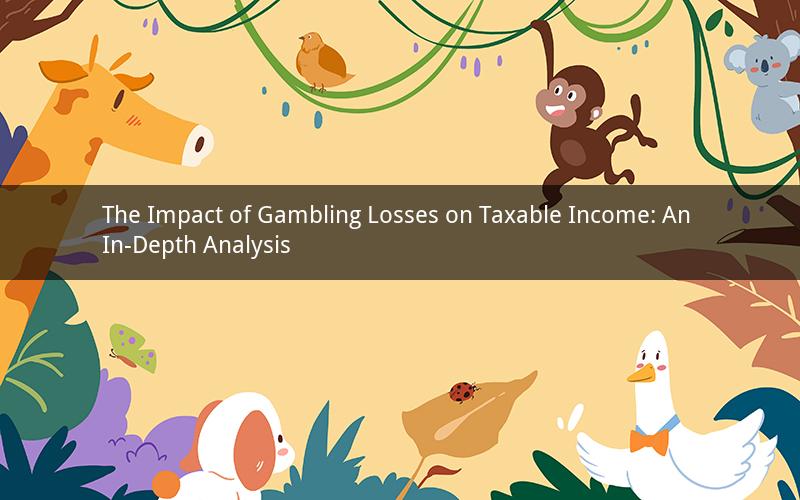
Gambling is a popular pastime that offers excitement and the chance to win money. However, many gamblers also experience losses, which can have significant tax implications. One common question among gamblers is whether their losses can be deducted from their taxable income. This article delves into this topic, exploring the rules and regulations surrounding gambling losses and their impact on taxable income.
Understanding Taxable Income
Before we delve into gambling losses, it's essential to understand the concept of taxable income. Taxable income is the amount of income that the government taxes. It includes wages, salaries, tips, dividends, interest, and other forms of income. For individuals, taxable income is calculated by subtracting allowable deductions from adjusted gross income (AGI).
Gambling Losses and Tax Deductions
Gambling losses can be deducted from taxable income, but only up to a certain limit. According to the IRS, gamblers can deduct gambling losses on Schedule A, Itemized Deductions, as long as they maintain detailed records of their winnings and losses.
Here's what you need to know about deducting gambling losses:
1. Keep detailed records: To deduct gambling losses, you must maintain detailed records of your winnings and losses. This includes receipts, betting slips, and any other documentation that proves the amount of your winnings and losses.
2. Deduct only actual losses: You can only deduct actual losses, not losses that exceed your winnings. For example, if you win $1,000 but lose $1,500, you can only deduct $1,000.
3. Limitation on deductions: You can deduct gambling losses only up to the amount of your gambling winnings. If you have gambling winnings of $5,000 and gambling losses of $10,000, you can deduct only $5,000 from your taxable income.
4. Proving the losses: If the IRS challenges your deduction, you'll need to provide proof of your losses. This could include receipts, betting slips, and bank statements.
5. Reporting the winnings: Regardless of whether you deduct your losses, you must report all your gambling winnings as income on your tax return.
Impact on Taxable Income
Now that we understand the rules surrounding gambling losses and tax deductions, let's examine how these losses impact taxable income.
1. Reducing taxable income: Deducting gambling losses can significantly reduce your taxable income, potentially lowering the amount of tax you owe. This can be particularly beneficial for high-earners who are in higher tax brackets.
2. Timing of deductions: You can deduct gambling losses in the same year you incurred them, which can provide immediate tax relief. However, if you don't have enough gambling losses to offset your winnings, you can carry forward the remaining losses to future years.
3. Capital gains: If you have capital gains from investments or real estate, you can use gambling losses to offset these gains, potentially reducing your tax liability on the gains.
4. Impact on tax credits: Deducting gambling losses may affect your eligibility for certain tax credits, such as the Child Tax Credit or the Earned Income Tax Credit. It's essential to consult a tax professional to understand how your deductions might impact your eligibility for these credits.
5. Reporting requirements: If you deduct gambling losses, you must report them on your tax return. Failure to do so could result in penalties or audits.
Frequently Asked Questions
1. Can I deduct gambling losses from my business income?
Answer: No, gambling losses cannot be deducted from business income. They must be reported as personal expenses on Schedule A, Itemized Deductions.
2. Can I deduct my spouse's gambling losses if we file a joint return?
Answer: Yes, you can deduct your spouse's gambling losses if you file a joint return. However, the deductions must be reported on Schedule A.
3. Can I deduct my gambling losses if I only win occasionally?
Answer: Yes, you can deduct your gambling losses even if you only win occasionally. As long as you maintain detailed records of your winnings and losses, you can deduct the actual amount of your losses.
4. Can I deduct my gambling losses if I'm a professional gambler?
Answer: Professional gamblers can deduct gambling losses as business expenses. However, they must report all their gambling income and may be subject to self-employment taxes.
5. Can I deduct my gambling losses if I lose money at a casino?
Answer: Yes, you can deduct your gambling losses at a casino, as long as you maintain detailed records of your winnings and losses and report all your gambling income on your tax return.
In conclusion, gambling losses can have a significant impact on taxable income. By understanding the rules and regulations surrounding these deductions, gamblers can take advantage of potential tax savings. However, it's essential to maintain detailed records and consult a tax professional to ensure compliance with the IRS guidelines.